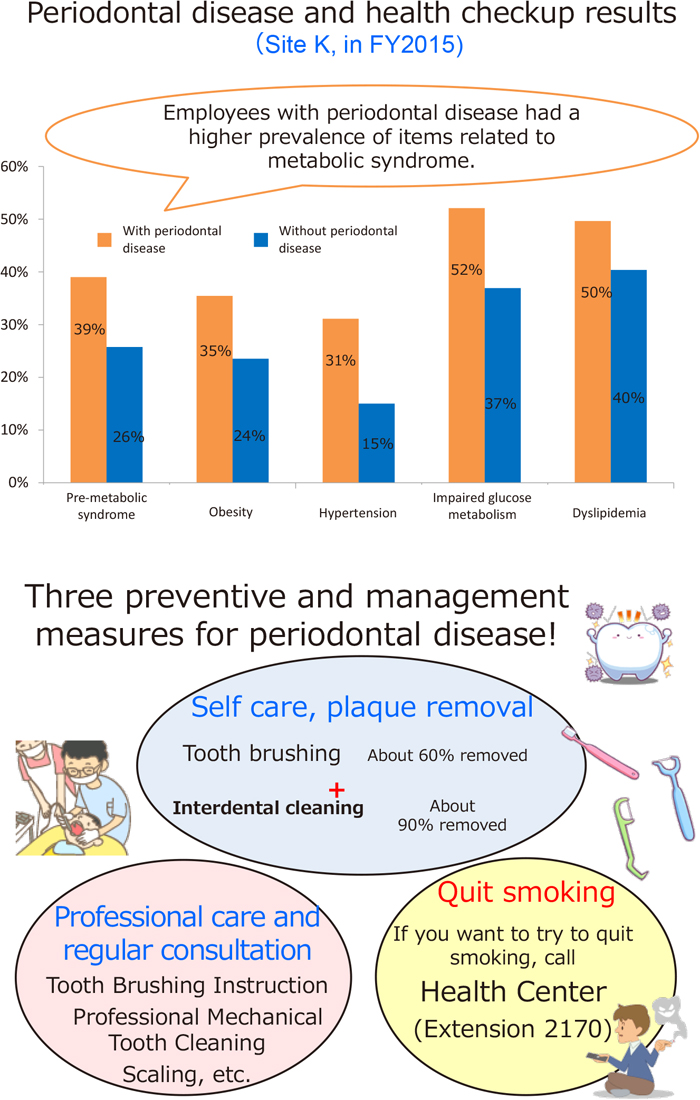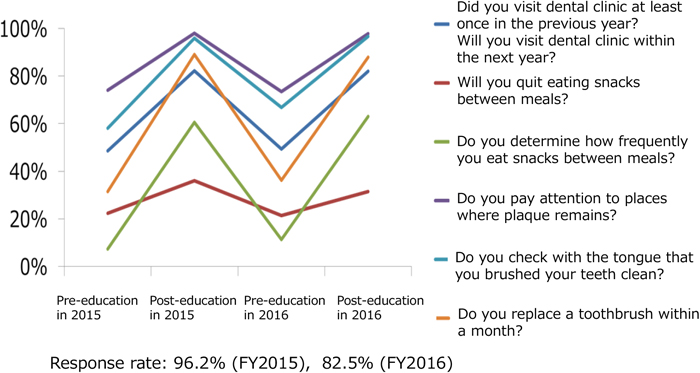2020 Volume 2 Issue 1 Article ID: 2020-GPS04
2020 Volume 2 Issue 1 Article ID: 2020-GPS04
Our Health Insurance Society has recognized that although dental care expenditure accounts for the greatest part of total medical spending, only a small number of insured persons use our dental checkup services. Among work sites in our company, Site K (with about 3,000 employees) is of larger scale and is characterized by greater dental care costs and medical costs for hypertension and diabetes mellitus when compared with the other sites. Therefore, in a project carried out by the Health Insurance Society, dental checkups in the occupational setting were performed on all employees at Site K. Continued improvement in dental health behavior among employees was subsequently attained through the means of health educational seminars held by occupational health nurses at each workplace who visited the workplace at the site.
To encourage employees to act voluntarily to take care of their own dental health, it was considered necessary to conduct health educational seminars which provide and deepen basic knowledge about dental health, the relationship between dental health and lifestyle-related diseases, and self-care, in addition to dental checkups in the occupational setting.
Site K covers a huge area: the time required to reach the venue for health educational seminars should be shortened to reduce the length of time during which they are away from their workplace. Since 2009 occupational health nurses at Site K have visited individual workplaces to hold health educational seminars. It was considered that utilization of these seminars to conduct this project would be accepted at these workplaces.
Dental checkups in the occupational setting were contracted out to a dental checkup company, which performed the checkup on 500 employees in 2012 as a trial, and then on all employees in 2013 to 2015. Approximately half of the employees who were given a rating of “need treatment for decayed tooth (teeth)” at the dental checkup in 2013 had not gone to a dental clinic by the time of the next year’s dental checkup. Therefore, in 2015, the dental checkup was performed and in addition, occupational health nurses visited each workplace to hold health educational seminars in which education about dental health was also conducted. In 2016, no dental checkup was performed, but health educational seminars including dental health were held at each workplace by occupational health nurses who visited the workplace.
2. Outline of health educational seminars at each workplace by occupational health nurses who visited the workplaceThe time and place for the health educational seminars were decided after discussion with the health leader, whose role is to undertake initiatives to increase employees’ awareness of health at each workplace. Site K measures 5 km from east to west and 3 km from north to south, and has an area of 5,700,000 m2. At Site K, there are 54 workplaces. Health educational seminars were held to accommodate work schedules. (Each seminar lasted for 30 minutes, and a total of 75 seminars was held per year.)
The lecturers were 3 occupational health nurses of the Health Insurance Society who are stationed at Site K and the site nurses. In the seminar, in cooperation with the dental checkup company, participants were motivated to improve their dental health behavior in a session based around PowerPoint presentations. Subsequently, practical training was conducted with a movie on tooth brushing and a movie on dental flossing.
Approximately half of the employees who were given a rating of “need treatment for decayed tooth (teeth)” at the dental checkup in 2014 did not go to a dental clinic. In the health educational seminars in 2015, basic knowledge about the prevention of tooth decay, importance of regular checkups, and the correct way of brushing teeth was introduced, and practical training on tooth brushing was then conducted.
In 2016, while data created by comparing the results of regular health checkups and those of dental checkups at Site K were presented, the prevention of periodontal disease, relationship between periodontal disease and lifestyle-related diseases, and effects of tobacco use were explained. In addition, interdental cleaning devices were introduced and practical training on dental flossing was conducted (Fig. 1).

Health educational seminars in 2016
Furthermore, over the 2-year period before and after the educational seminars, a questionnaire survey on the same items was conducted 4 times to check for changes in dental health behavior.
The questionnaire survey (Fig. 2) indicated that there are two types of actions, i.e., those which are easily incorporated into the daily routine and those which are not. Among others, comparison of the pre-education data in 2015 and the pre-education data in 2016 revealed that the percentage of responders who answered “Yes” to the question “Do you check with the tongue that you brushed your teeth clean?” increased by 8.8%, suggesting that this action can be easily done, and makes the person realize that it is effective when continuously performed.

Questionnaire survey results before and after delivery of health educational seminars
The percentage of employees who visited dental clinics increased after the implementation of the dental checkup when compared with the corresponding data before that (Fig. 3), suggesting that the increase was an effect of the implementation of the dental checkup in the occupational setting. Subsequently, the percentage of employees who visited dental clinics tended to decrease, partly because occupational health nurses went to each workplace to hold health educational seminars in which employees were motivated to incorporate selfcare behavior into their routine. However, dental care spending per dental care receiver did not tend to increase, which may serve to indicate that no major therapies were required.

Dental consultation rate and dental care spending per dental care receiver
We are now able to implement the lifestyle-related disease education seminars, including the dental health education. In the future, it is planned to continuously include the content of dental health in the health educational seminar for the purpose of making employees more aware of the importance of dental health.
This project has demonstrated that although dental health education is usually provided by dental specialists, education conducted by occupational health nurses is also effective in improving employees’ dental health behavior. In addition, the authors realized that approaching lifestyle-related diseases from the perspective of dental health in the health educational seminar is well accepted by employees. Occupational health nurses have the advantage that they can mention the relationship between lifestyle-related diseases and dental diseases1) at every opportunity in occupational health activities, including health education.
In this project, dental checkups in combination with repeated holding of health educational seminars improved employees’ dental health behavior and had a favorable impact on dental care spending per dental care receiver.
The authors declare no conflicts of interest.
The committee for continuing education of Japan Society for Occupational Health has responsibility for the synthesis and dissemination of educational opportunities in occupational health, including selection of Good Practice Samples (GPS). This good practice sample was awarded and released in Japanese as the best good practice by the committee (https://gps.sanei.or.jp/). With the permission of the committee for continuing education of Japan Society for Occupational Health and the editorial boards for Environmental and Occupational Health Practice, the GPS was translated into English for publication.